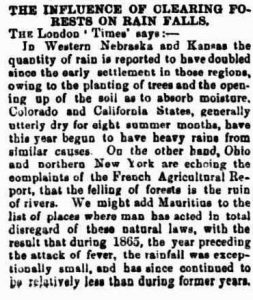
Example of a newspaper article on forests and climate: Armidale Express and New England General Advertiser, 23 January 1869, p. 4
Dating back to classical antiquity in the western world, the contested notion that climate was changing due principally to the human impact on forests was strongly revived in the mid-nineteenth century. Foresters and botanists, many of whom were employed as public servants, led the revival. They argued on the basis of the lessons of history and scientific evidence in an attempt to shape government policy on forest management. Much of the concern with the impact of forests on climate would have remained the almost exclusive domain of scientists, were it not for the role of journalists in popularising and politicising the idea. Throughout the latter half of the 19th and first quarter of the 20th centuries, newspaper coverage of the debate transformed a dusty scientific enquiry into a vibrant but increasingly polarised public debate. An increasingly widespread popular article of faith, the twin ideas of climate change and forest influence persisted until at least the 1920s buoyed by a sympathetic press and growing bands of conservationists. Ultimately, however, the ideas were debunked by climatologists and rejected by mainstream science.
Stephen Legg is an Adjunct Senior Research Fellow in History in the School of Philosophical, Historical and International Studies at Monash University. In this episode of the Exploring Environmental History Podcast Stephen discusses the development of the debate surrounding the influence of forests on climate, the role of the press in shaping and communicating scientific ideas and how it illuminates the broader role of science in society. He also compares the engagement of governments, science and the press internationally, and how this debate in turn related to ideas about conservation and climate change.
Further reading and resources
Stephen Legg, “Debating the Climatological Role of Forests in Australia, 1827 – 1949: A Survey of the Popular Press”, in: James Beattie, Emily O’Gorman, and Matthew Henry (eds.), Climate, Science, and Colonization: Histories from Australia and New Zealand (Palgrave, New York, 2014), pp. 119-136.
Clarence J. Glacken, Traces on the Rhodian shore: Nature and culture in Western thought from ancient times to the end of the eighteenth century (Oakland: University of California Press, 1973).
Music credits
“Silica” by fluffy, available from ccMixter
“C120-12string-guitar-arps” by Javolenus, available from ccMixter


Recent Comments